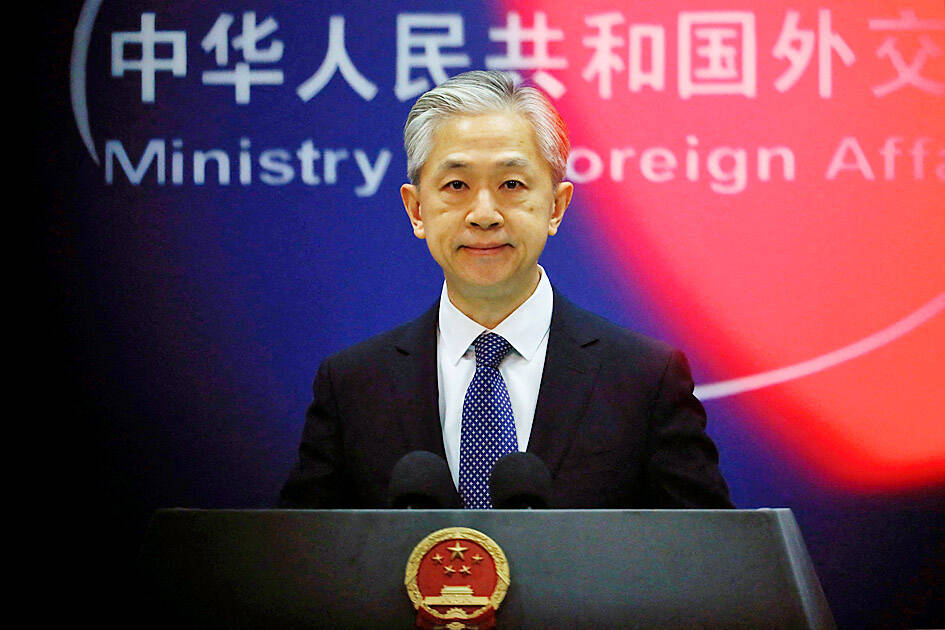China is targeting citizens studying abroad for their political activism, rights group Amnesty International said yesterday, with some students reporting harassment of family members back home.
China does not tolerate political dissent and has used sophisticated tech tools and intimidation to crack down on domestic protesters and activists.
Moreover, Beijing’s curbs on political activism are increasingly expanding abroad in the form of “transnational repression,” Amnesty International said in a report, citing interviews with dozens of students in eight European and North American countries.

Photo: Reuters
Overseas students reported that family members in China received threats after they attended events abroad, including commemorations of the bloody 1989 Tiananmen Square crackdown, the group said.
“Threats made to family members in mainland China included to revoke their passports, get them fired from their jobs, prevent them from receiving promotions and retirement benefits, or even limiting their physical freedom,” it said.
Students also said they had been blocked from posting and surveilled on Chinese social apps — often the only way to communicate with family members due to Beijing’s Internet firewall.
One student told Amnesty International that police showed his parents “transcripts of his online WeChat conversations with family members.”
Students said that they self-censored during classes and social interactions, and complained of mental health problems caused by the feeling of pervasive surveillance, “ranging from stress and trauma to paranoia and depression.”
“I would really want to publish my thesis ... but I’m worried, so I chose not to,” one student told Amnesty.
Asked about the Amnesty report, the Chinese Ministry of Foreign Affairs dismissed it as “purely malicious smears.”
“Any objective media outlet would find that the vast majority of Chinese citizens living abroad feel proud of the motherland’s development and strength,” ministry spokesman Wang Wenbin (汪文斌) said.
It has previously rejected claims that it targets citizens living abroad, insisting that it respects other countries’ sovereignty and that any policing operations are conducted in accordance with the law.
A report last year by US research group Freedom House found that China was responsible for hundreds of cases of “transnational repression” since 2014, including attempts to pressure other nations to forcibly return members of the Uighur minority.
Amnesty International yesterday said that Beijing’s targeting of students has “engendered a ‘climate of fear’ on university campuses across Western Europe and North America, negatively impacting upon students’ human rights.”
“The impact of China’s transnational repression poses a serious threat to the free exchange of ideas that is at the heart of academic freedom,” Amnesty International’s China director Sarah Brooks said.

EXPRESSING GRATITUDE: Without its Taiwanese partners which are ‘working around the clock,’ Nvidia could not meet AI demand, CEO Jensen Huang said Taiwan Semiconductor Manufacturing Co (TSMC, 台積電) and US-based artificial intelligence (AI) chip designer Nvidia Corp have partnered with each other on silicon photonics development, Nvidia founder and CEO Jensen Huang (黃仁勳) said. Speaking with reporters after he met with TSMC chairman C.C. Wei (魏哲家) in Taipei on Friday, Huang said his company was working with the world’s largest contract chipmaker on silicon photonics, but admitted it was unlikely for the cooperation to yield results any time soon, and both sides would need several years to achieve concrete outcomes. To have a stake in the silicon photonics supply chain, TSMC and

IDENTITY: Compared with other platforms, TikTok’s algorithm pushes a ‘disproportionately high ratio’ of pro-China content, a study has found Young Taiwanese are increasingly consuming Chinese content on TikTok, which is changing their views on identity and making them less resistant toward China, researchers and politicians were cited as saying by foreign media. Asked to suggest the best survival strategy for a small country facing a powerful neighbor, students at National Chia-Yi Girls’ Senior High School said “Taiwan must do everything to avoid provoking China into attacking it,” the Financial Times wrote on Friday. Young Taiwanese between the ages of 20 and 24 in the past were the group who most strongly espoused a Taiwanese identity, but that is no longer

A magnitude 6.4 earthquake and several aftershocks battered southern Taiwan early this morning, causing houses and roads to collapse and leaving dozens injured and 50 people isolated in their village. A total of 26 people were reported injured and sent to hospitals due to the earthquake as of late this morning, according to the latest Ministry of Health and Welfare figures. In Sising Village (西興) of Chiayi County's Dapu Township (大埔), the location of the quake's epicenter, severe damage was seen and roads entering the village were blocked, isolating about 50 villagers. Another eight people who were originally trapped inside buildings in Tainan

SHARED VALUES: The US, Taiwan and other allies hope to maintain the cross-strait ‘status quo’ to foster regional prosperity and growth, the former US vice president said Former US vice president Mike Pence yesterday vowed to continue to support US-Taiwan relations, and to defend the security and interests of both countries and the free world. At a meeting with President William Lai (賴清德) at the Presidential Office in Taipei, Pence said that the US and Taiwan enjoy strong and continued friendship based on the shared values of freedom, the rule of law and respect for human rights. Such foundations exceed limitations imposed by geography and culture, said Pence, who is visiting Taiwan for the first time. The US and Taiwan have shared interests, and Americans are increasingly concerned about China’s